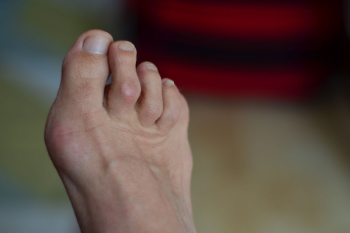
Hammertoe is a foot deformity characterized by an abnormal bending of the toe joints, causing the affected toes to resemble a hammer or claw. This condition typically affects the second, third, or fourth toes, although it can occur in any toe. Hammertoe often develops gradually over time, due to factors like ill-fitting shoes, foot structure abnormalities, or muscle imbalances. One of the noticeable features of hammertoe is the bending of the toe joints, resulting in a permanent, abnormal position that may cause pain, discomfort, or difficulty walking or wearing shoes. Other characteristic symptoms include corns or calluses forming on the tops of the affected toes due to friction and pressure from rubbing against footwear. Additionally, individuals with hammertoe may experience limited range of motion in the affected toes, making it challenging to straighten or flex them fully. If you notice a deformity in your toes, it is suggested that you make an appointment with a podiatrist for an exam, a diagnosis and the appropriate treatment.
Hammertoe
Hammertoes can be a painful condition to live with. For more information, contact Kenneth Donovan, DPM from Advanced Care Foot and Ankle. Our doctor will answer any of your foot- and ankle-related questions.
Hammertoe is a foot deformity that affects the joints of the second, third, fourth, or fifth toes of your feet. It is a painful foot condition in which these toes curl and arch up, which can often lead to pain when wearing footwear.
Symptoms
- Pain in the affected toes
- Development of corns or calluses due to friction
- Inflammation
- Redness
- Contracture of the toes
Causes
Genetics – People who are genetically predisposed to hammertoe are often more susceptible
Arthritis – Because arthritis affects the joints in your toes, further deformities stemming from arthritis can occur
Trauma – Direct trauma to the toes could potentially lead to hammertoe
Ill-fitting shoes – Undue pressure on the front of the toes from ill-fitting shoes can potentially lead to the development of hammertoe
Treatment
Orthotics – Custom made inserts can be used to help relieve pressure placed on the toes and therefore relieve some of the pain associated with it
Medications – Oral medications such as anti-inflammatories or NSAIDs could be used to treat the pain and inflammation hammertoes causes. Injections of corticosteroids are also sometimes used
Surgery – In more severe cases where the hammertoes have become more rigid, foot surgery is a potential option
If you have any questions please contact our office located in Charleston, SC . We offer the newest diagnostic and treatment technologies for all your foot and ankle needs.
